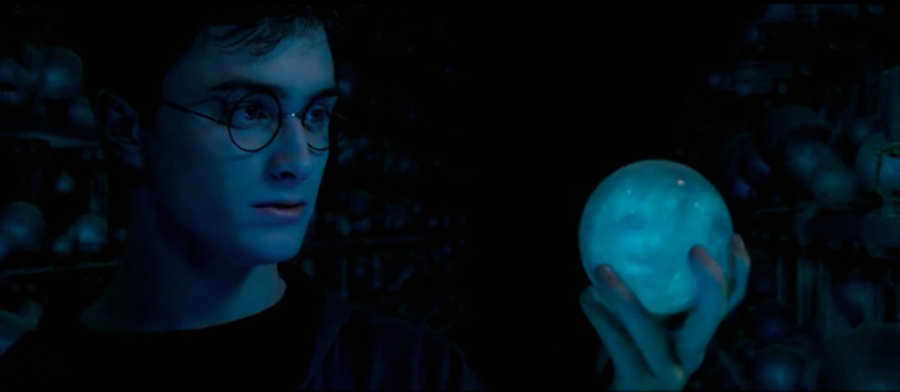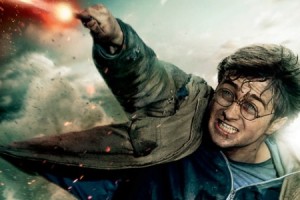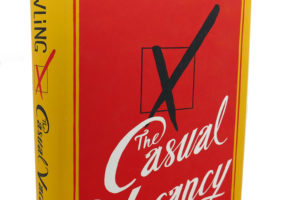[If you haven’t read Harry Potter, don’t read this post. Exit out of it and buy the first book here].
This week was the anniversary of when Harry Potter and his friends entered the department of Mysteries in the Ministry of Magic (in Order of the Phoenix). It is by far my favorite scene in the whole series (Order of the Phoenix, however, is not my favorite book!). For those who need a brief reminder: Harry thinks that Voldemort has his godfather Sirius captive in the Department of Mysteries, but Voldemort only placed that thought in Harry’s mind just to lure him. He lures Harry there so that he would take a prophecy that only Harry and Voldemort could retrieve from shelves full of prophecies. Voldemort obviously wasn’t going to waltz right into the Ministry of Magic, so he finds a way to bring Harry there to retrieve it himself. In the battle that ensues after Harry retrieves the prophecy, the orb is is smashed and nobody hears the prophecy spoken.
Afterwards, however, Harry finds out from Dumbledore that the prophecy was recited to him when it was originally made by Sybill Trelawney in 1980. Dumbledore tells Harry the prophecy:
The one with the power to vanquish the Dark Lord approaches….Born to those who have thrice defied him, born as the seventh month dies…and the Dark Lord will mark him as his equal, but he will have power the Dark Lord knows not, and either must die at the hand of the other for neither can live while the other survives….the one with the power to vanquish the Dark Lord will be born as the seventh month dies. (Harry Potter and the Order of the Phoenix, 841)
Later in the office Harry recounts the prophecy to Dumbledore: “So does that mean that . . . that one of us has got to kill the other one . . . in the end?” Dumbledore answers: “Yes” (844). The reader at this juncture in the narrative will likely interpret the text in this way: if this story will have a happy ending, Harry will kill Voldemort. If this series is to become a tragedy, then Voldemort will kill Harry. What is fascinating about this is that the prophecy never tells the reader anything clearly about the context, nature, and– most importantly – the interpretation of these words concerning the potential death of Harry or Voldemort.
When most readers come across the prophecy in Order of the Phoenix, they operate under the assumption that the one who kills the other is the one who will be victorious. Yet in the final book we read of an entire reversal of this scheme. Harry finds himself to be the true victor as the one who ‘greeted death as an old friend’ (Deathly Hallows, 352), walking willingly into his own death through Voldemort’s killing curse. This was, of course, the only way for the last horcrux – Harry himself – to be destroyed. Surely Rowling is pushing us to reconsider our conceptions of victory and death, and the relationship between the two. If we are surprised at how the prophecy is finally fulfilled, it unveils the potentially problematic beliefs we have about triumph in life and death, as most readers likely would initially read the prophecy assuming, again, that the one who physically lives is the one who becomes the victor.
” ‘There is nothing worse than death, Dumbledore!’ snarled Voldemort. ‘You are quite wrong,’ said Dumbledore . . . ‘Indeed, your failure to understand that there are things much worse than death has always been your greatest weakness’ (Order of the Phoenix, 814). Voldemort’s weakness may be our own, and Rowling is hinting to her readers to see if they think similarly to Voldemort lest they also transform into the sub-human monster that he becomes. There are worse things than death, and Voldemort is the living manifestation of what is worse than death itself: one who has turned inward and deformed his own soul, knowing no love, no generosity, no friendship, and no self-sacrifice.
The ending of Harry Potter challenges our assumptions about physical life and death, and the value that we ascribe to these events. “Do not pity the dead, Harry. Pity the living, and above all, those who live without love” (Deathly Hallows, 609). Harry learns this lesson in the end of the series. Harry’s own death is the means by which he can best love his friends, his loved ones, and the rest of the world, since with Harry alive Voldemort’s soul can still live on and terrorize the world. Harry chooses love over life, demonstrating that he has indeed learned that there are worse things than death, and that there are better things than life. Hopefully we all can learn the same.





1 Comment
Leave your reply.